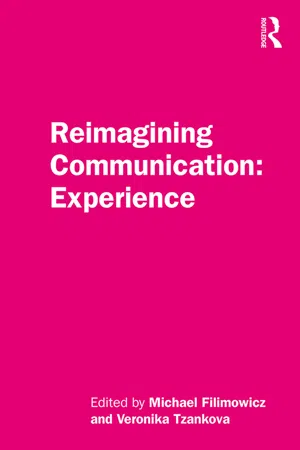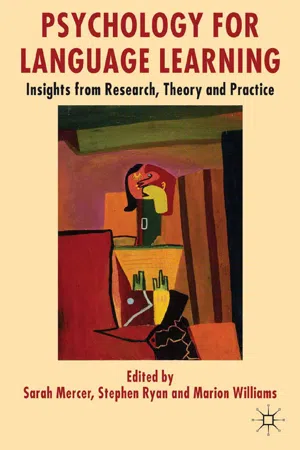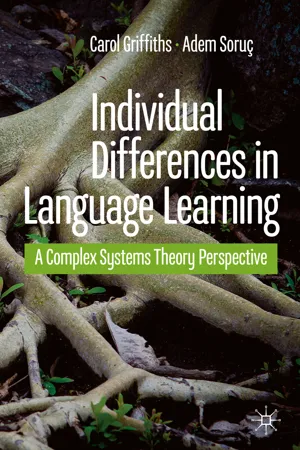Languages & Linguistics
Affect or Effect
"Affect" is a verb that means to influence or produce a change in something. It is often used in psychology and linguistics to describe the emotional or attitudinal state of a person. "Effect," on the other hand, is a noun that refers to the result or outcome of an action. In linguistics, these terms are important for understanding how language can influence emotions and behavior.
Written by Perlego with AI-assistance
Related key terms
1 of 5
5 Key excerpts on "Affect or Effect"
- eBook - ePub
- Michael Filimowicz, Veronika Tzankova(Authors)
- 2020(Publication Date)
- Routledge(Publisher)
6 COMMUNICATING AFFECTFace-to-Face and Online
Monica A. Riordan, Alexander A. Johnson and Roger J. KreuzIntroduction
People speak to one another not only to exchange information, but also to compliment, to complain, to flirt, and to flatter. One of the most important uses of language, therefore, may be the communication of affective states from one person to another. In the mid-nineteenth century, the linguist Max Müller proposed a number of theories to explain the origin of language. He included among these the so-called “pooh-pooh” or interjectional theory, which is the notion that language arose from spontaneous and involuntary cries of joy or pain, such as “Ah!” or “Ow!” (Müller, 1864). Although this suggestion has not fared well in the marketplace of ideas, it does highlight the importance of understanding the ways in which affect is expressed through language and other means. This chapter will provide a summary of research on the communication of affect1 , with particular attention to how this is accomplished via electronic means such as by email, text messaging, and through social media.Affect and Language
Vocabulary
Although researchers continue to debate whether there exists a finite set of “basic” emotion concepts (e.g., Scarantino, 2015), it is clear that all of the world’s languages possess a myriad of terms for describing affective states. However, not all of these terms can be translated with fidelity and precision into other languages (Lomas, 2018). And even within the same language, emotion terms like pride and sorrow can change and shift their meanings over time (Tissari, 2017). This is true even for basic affective terms like anger - eBook - PDF
Psychology for Language Learning
Insights from Research, Theory and Practice
- S. Mercer, S. Ryan, M. Williams, S. Mercer, S. Ryan, M. Williams(Authors)
- 2012(Publication Date)
- Palgrave Macmillan(Publisher)
8 Affect: The Role of Language Anxiety and Other Emotions in Language Learning Peter MacIntyre and Tammy Gregersen Introduction The term ‘affect’ includes many things, such as feelings of self- confidence, feeling willing to communicate, or feeling anxious. Perhaps the most widely studied affective reaction to L2 communication, and the main focus of this chapter, is language anxiety. Language anxiety is a term that encompasses the feelings of worry and negative, fear-related emotions associated with learning or using a language that is not an individual’s mother tongue. The term covers language being learned in locations where intergroup contact is available (so-called ‘second’ lan- guage) or not available (so-called ‘foreign’ language) and also covers various language skills (especially speaking, but also reading, writing, and comprehension). After reviewing the literature on language anxi- ety, we will consider the issue of affective variables more broadly. There is still much to learn about the role of affective variables in Second Lan- guage Acquisition (SLA), and we will conclude with some suggestions for future research. Overview of the literature on language anxiety Whereas the literature on language anxiety has discussed the possibility of the positive effects of stress, sometimes called eustress or facilitating anxiety, a tension and arousal that keeps learners alert (Ehrman, 1996), it is important to emphasize that this chapter deals with anxiety in its debilitating form. With this caveat in mind, one of the most consistent findings in the SLA literature is that higher levels of language anxi- ety are associated with lower levels of language achievement (Dewaele, 103 104 Affect 2007; Gardner & MacIntyre, 1993; Horwitz, Horwitz, & Cope, 1986; MacIntyre & Gardner, 1991a, 1991b, 1991c; Onwuegbuzie, Bailey, & Daley 1999, 2000, 2002; Sanchez-Herrero & Sanchez, 1992; Woodrow, 2006). - eBook - ePub
Individual Differences in Language Learning
A Complex Systems Theory Perspective
- Carol Griffiths, Adem Soruç(Authors)
- 2020(Publication Date)
- Palgrave Macmillan(Publisher)
© The Author(s) 2020 C. Griffiths, A. Soruç Individual Differences in Language Learning https://doi.org/10.1007/978-3-030-52900-0_11Begin Abstract11. Affect
Carol Griffiths1andAdem Soruç 2(1) Girne American University, Girne/Kyrenia, North Cyprus(2) Department of Education, University of Bath, Bath, UKKeywords Anxiety Attribution Self-efficacyEnd AbstractTo Get You Thinking Before You Read
- 1. Do you think that our emotions affect the way we learn language?
- 2. Why do you think affect has tended to be a neglected factor in language learning?
- 3. Which of our emotions do you think has most effect on language development?
- 4. How do you think students can control their emotions in order to study most effectively?
- 5. Can you think of any examples where a change in affective state has affected your own or someone else’s ability to learn effectively?
Background
The role of affect (feelings or emotions) in language learning has long been recognized. A well-known case study conducted by Schumann (1975 ) investigated the factors which led to the slow progress made by his subject, a 33-year-old Puerto Rican immigrant to the USA; since Schumann (ibid.) concluded that neither age not lack of cognitive ability could account for the slow progress made by his subject, he ascribed his observations to affective difficulties, including social distance (Schumann, 1976 ). Lozanov (1978 ) developed a special teaching method (Suggestopedia, which aims to use a pleasant, colourful, relaxed environment to promote positive emotions) around the idea that emotional reactions play a key role in language development. Krashen (1982 ) introduced the Affective Filter Hypothesis, explaining that the higher the affective filter (that is, the more negative the emotions), the more difficulty the learner will experience. Arnold (1999 ) has devoted a book to various aspects of affect in language learning, dealing with issues such as neurobiology, anxiety , ego boundaries, self-esteem , the role of teachers, and issues related to interaction with others. More recently, there has been a move to what has been termed positive psychology , which, rather than focusing on negative behaviour and thinking, emphasizes creativity and constructive attitudes (e.g. Csikszentmihalyi, 2014 ; Peterson, 2006 ; Seligman, 2004 - Stewart Clegg, James R. Bailey, Stewart R Clegg, James Bailey(Authors)
- 2007(Publication Date)
- SAGE Publications, Inc(Publisher)
It is the dimension of human life that allows us to experience a situation as good or bad, positive or negative, disturbing or comforting, and so forth. Conceptual Overview The term affect is one of the most problematic con-cepts in the psychology literature. There is no consen-sus at all on how to define affect and related concepts such as mood, emotion, and feelings. The perplexing differences in the usage of this affective lexicon were signaled by researchers who claimed that the goal of clearly understanding how to define these terms is almost impossible. However, those same authors have now furnished us a common frame to understand it. Affect is now understood as an umbrella concept that includes mood and emotion but are not restricted to them. As Gerald Clore stated, the term refers to a class of different feelings that have a positive or negative valence. In this perspective, feelings, which are subjective experiences associated with different physiological correlates, are the essence of all differ-ent types of affective states. However, not all feelings are affective. Feelings like uncertainty (confidence in a judgment) have a cognitive tone, and feelings like hunger and thirst are referred to as body-sensations. Thus, what differentiates affective feelings is the valence that is associated to its experiential, cognitive, and physiological components. Mood and emotion are, in turn, affective-states (time-bound, changing experiences) distinguished on their duration, intensity, diffuseness, and attribu-tion cause. Mood in contrast to emotions is pervasive (since we are always in some specific mood), lower in intensity, and more diffuse and global. Thus, con-trary to emotions, mood does not demand attention and does not interrupt ongoing thought. Although moods usually do not have a traceable antecedent, it is assumed to change in valence with reference to the relation between our internal and external world (thus dependent upon situational cues).- eBook - ePub
- Lourdes Ortega(Author)
- 2014(Publication Date)
- Routledge(Publisher)
9Affect and other individual differences
Our understanding of why people differ so greatly in how fast, how well and by what means they learn a second language would be incomplete if we did not consider affect and the multiple roles it plays in L2 learning. Let us return briefly to our French learners from Chapter 7 . The most pervasive and startling difference in the two experiences recounted in their books resides with the affective relationship Watson and Kaplan appear to have developed towards the L2. As Table 9.1 illustrates, for Watson learning French felt like an assault to his own self (‘alien influences seeping down from above’), whereas for Kaplan French felt like nourishing and welcome transformation of the self (‘I was full of French, it was holding me up, running through me’).Learning and using a foreign language poses a threat to one's ego. It makes people vulnerable – particularly grown-ups who are accustomed to function perfectly well in their own language. For example, many beginning L2 learners resentfully report feeling ‘infantilized’ when they use the L2 (Spielmann and Radnofsky, 2001). At least until high levels of proficiency have been reached, someone who is trying out a new language cannot have good control over what they say in the L2, how they say it and what image of self they are able to project for their interlocutors. Similarly, they may be embarrassed and frustrated by the realization that they are unable to understand interlocutors fully and cannot respond appropriately. Perhaps some individuals (like Alice Kaplan) are better equipped for coping with these self-threatening experiences. By contrast, other individuals (like Richard Watson) suffer under such circumstances, sometimes with disastrous consequences for ultimately learning or not learning the L2. But where do these differences reside? What can psychologically oriented investigations of affect and L2 learning tell us about such differences?
Index pages curate the most relevant extracts from our library of academic textbooks. They’ve been created using an in-house natural language model (NLM), each adding context and meaning to key research topics.




